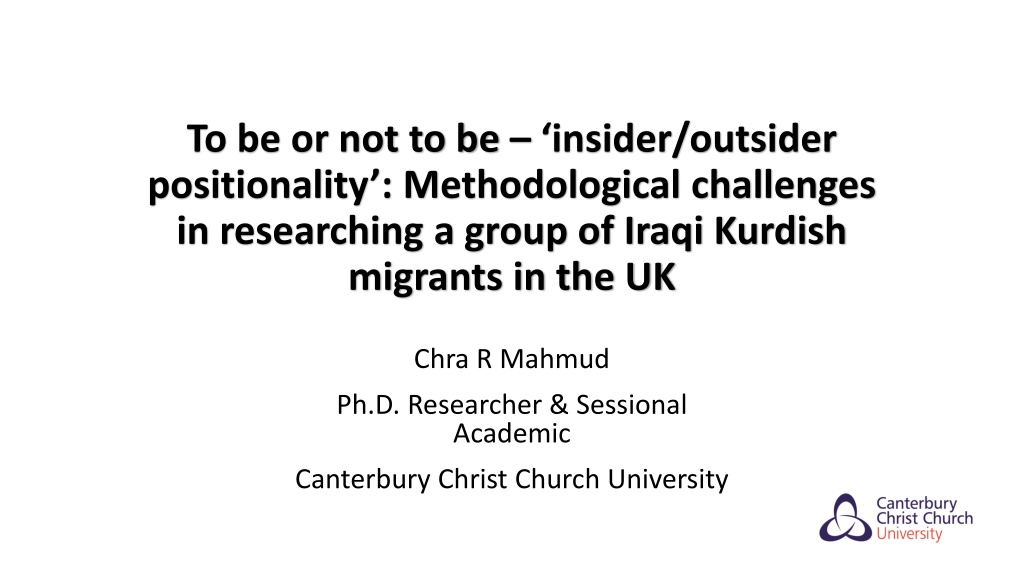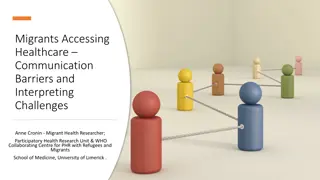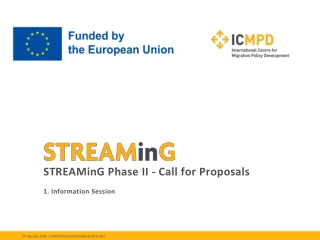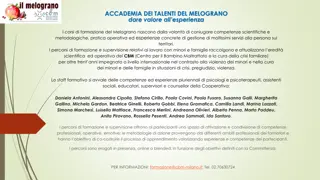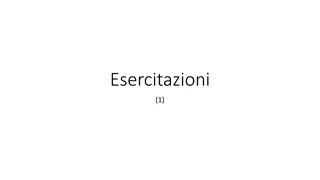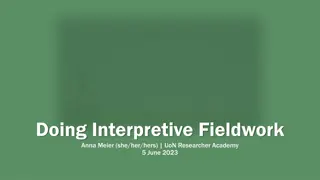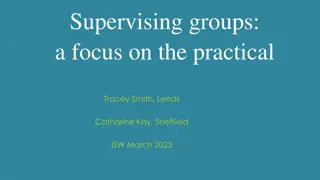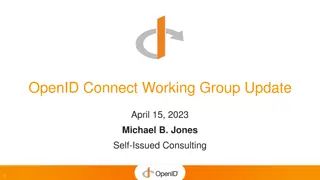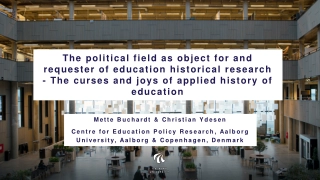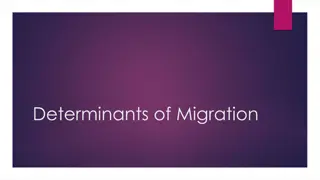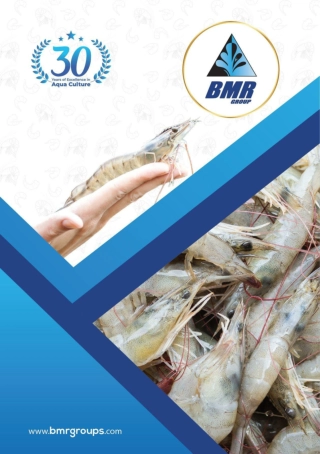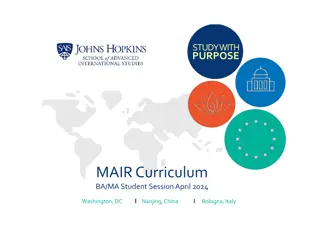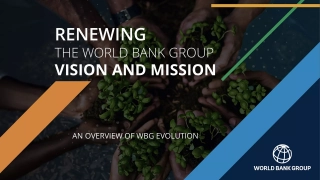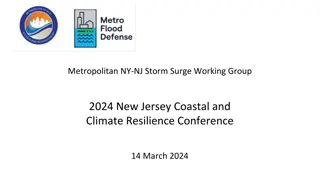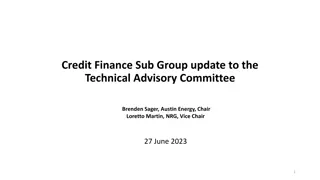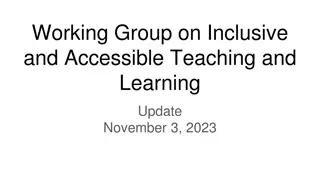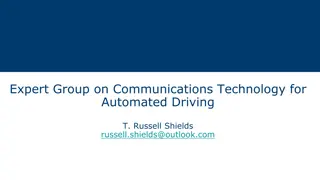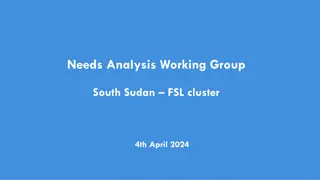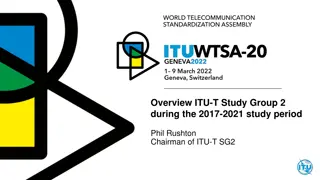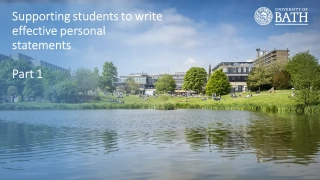To be or not to be – ‘insider/outsider positionality’: Methodological challenges in researching a group of Iraqi Kurdish migrants in the UK.
Research by Chra R. Mahmud explores the methodological challenges in studying Iraqi Kurdish migrants in the UK, focusing on insider-outsider positionality. The study delves into the lived experiences of this group, examining the researcher's status and identity negotiation during the research process. Positionality theory, benefits of acknowledging positionality, and the roles of insider, outsider, and in-between researchers are discussed. Findings and discussions shed light on the complexities of navigating various positionalities in research.
- Insider-outsider dynamics
- Iraqi Kurdish migrants
- Research challenges
- Positionality theory
- Qualitative research
Download Presentation
Please find below an Image/Link to download the presentation.
The content on the website is provided AS IS for your information and personal use only. It may not be sold, licensed, or shared on other websites without obtaining consent from the author. Download presentation by click this link. If you encounter any issues during the download, it is possible that the publisher has removed the file from their server.
Presentation Transcript
To be or not to be insider/outsider positionality : Methodological challenges in researching a group of Iraqi Kurdish migrants in the UK Chra R Mahmud Ph.D. Researcher & Sessional Academic Canterbury Christ Church University
Outlook The Research Background Research Questions Theoretical Framework Findings and Discussion Conclusions
The Research Background Examining the lived experiences of a group of Iraqi Kurdish migrants in the UK Multidisciplinary research, influenced by the postcolonial, post human and nonessential standpoints Qualitative in nature, following an interpretive constructivist approach (Holliday 2016). Multimodal data (spoken, written and visuals) Thematic and Reflexive Thematic Analysis (Braun & Clarke, 2006, 2019)
The Research Questions What it means to be an insider or/and outsider researcher? How are the researcher s status and identity negotiated and navigated throughout the research processes?
Positionality Theory Positionality is about where the researcher is coming from ontological and epistemological assumptions, and human nature and agency (Holmes, 2020, p.1-2). Identifying Positionality: researcher's relation to study subject connection with research participants role in research context and process (Malterud, 2001; Fleming, 2018 ). Benefits of Acknowledging Positionality: heightened self-awareness in research. awareness of potential biases. deeper understanding of research outcomes.
Insider, Outsider, or In-between Insider researchers are those who are considered part of the groups they study (Trowler, 2011; Kanuha, 2000), have distinctive access and actively work together to produce knowledge (Chhabra, 2020; Humphrey, 2007; Hellawell, 2006). Outsider researchers are those who conduct studies within communities or groups they do not belong to (Bridges, 2017; Hellawell, 2006) In-between researchers refer to those who occupy a position that falls between being a complete insider and a complete outsider within the specific groups or communities they study (Kerstetter, 2012).
Findings and Discussion
Murad (Interview 1) R: Tell me about your experiences dealing with people in your community and work placement, is there any story that you might find interesting to share? Murad: Throughout my career, I have had the opportunity to work closely with people from various backgrounds, and I've been actively serving as a counsellor since 2014. Remarkably, I can confidently state that I have never encountered any unpleasant experiences in all this time. R: Are you implying that you have not even experienced any instances of othering ? Murad: Not even once.
Researchers Reflection on Murads First Narrative The time I spent with Murad was both enlightening and unexpectedly challenging. It was during our interactions that I found myself facing a situation I had never anticipated, and it left me feeling uncertain about the path forward. I found myself in a complex and challenging position, where the lines between being an insider and an outsider blurred. Initially, I had believed that my insider status would provide me with unique insights into the participants experiences. However, as events unfolded, it became evident that my initial assumptions were flawed. This unexpected turn of events prompted me to re-evaluate my approach to the research and forced me to navigate uncharted territory in my role as a researcher.
Murad (Follow-up Interview) R: Is there anything else you would like to add that you might not have mentioned earlier? Murad: Let me share something that I hadn't revealed before. In my role as the leader of the opposition party within the [...], based in London, I view my journey as an asylum seeker who arrived without English proficiency, now I am a fluent English speaker, and this is a significant accomplishment. Nevertheless, I face persistent challenges from racist individuals within my own party. Despite their outward display of friendliness and kindness, their actions behind my back are deceitful and harmful. It's as if they wear a mask of benevolence while concealing malicious intentions. R: So, if I understand correctly, this experience is akin to othering, right? Murad: I term it as colonialracism [...].
Researchers Reflection on Murads Follow-up Interview My interaction with Murad presented an unexpected challenge that left a lasting impact on my research experience and my own personal narrative. It positioned me in a unique and somewhat ambiguous role, straddling the boundary between being an insider and an outsider, blurring the lines of my identity as either a participant or a mere observer. Initially, I held the belief that my insider status would provide me with special insights into the experiences of the participants. However, this belief was sharply challenged during my initial interview with Murad, as he still regarded me as an outsider despite our shared migrant backgrounds. As someone who has faced various obstacles on my own educational and professional journey as a migrant, I had a gut feeling that Murad might be holding back some information. This curiosity drove me to delve deeper into our discussions. When I probed Murad for more insights, I was pleasantly surprised by his openness and willingness to share the challenges he was facing within his organization. This experience underscored the vital significance of trust-building in our research process.
Amjad (Interview 1) R: You mentioned that you have undergone changes over the years, particularly transitioning from being religious to being non-religious. Would you be open to sharing more about this significant experience? Amjad: I find this topic deeply personal, and honestly, I prefer not to discuss it further.
Researchers Reflection on Amjads First Interview Amjad s stories about how his identity has changed over time have a deep impact on me. I m curious about why he sees this part of his life as very personal, especially when he s been open about even more sensitive topics regarding his identity and family. This curiosity drives me to dig deeper into his experiences, not just to understand them, but to thoroughly explore all the different aspects of his evolving identity.
Amjad (Follow-up Interview) R: You are talking about interesting stories, which I think they are linked to your religious identity. Are you still sure you would like to skip my question about your identity shift from being religious to none religious? Amjad: This was tough, perhaps the hardest decision I have ever made in my life. I endured a prolonged and arduous period where I questioned everything. I used to engage in hours of conversation with God daily. However, I eventually came to feel that the story of the Kaaba was fabricated and lacked authenticity. For me, I believe God resides within me, making traditional prayers incongruent with my beliefs about divinity. I harbour no regrets about my decision; in my view, religion is more intertwined with culture than true spirituality.
Researchers Reflection on Amjads Follow-up Interview Finally, Amjad has graciously opened-up to me, and offered intriguing insights into the questions that had been on my mind. Given the delicate nature of discussing religious beliefs, it is possible that Amjad was concerned that sharing his views might unintentionally create challenges or conflicts with my own deeply held beliefs. As a result, he may have opted to keep this aspect of his identity to himself, seeking to preserve a sense of security and avoid any potential negative perceptions from me, especially since I occupy the role of an insider researcher.
Discussions and conclusion Insiders and outsiders in research are fluid roles, not rigid categories. Navigating this dynamic requires balancing participant perspectives and managing potential influences (Palaganas et al., 2017). Building genuine relationships relies on self-awareness and reflexive approaches, fostering better outcomes. Broadened Perspectives: Reflexivity enhances understanding, authenticity, and empathy in research. appreciating the complexity of human experiences. Balancing insider and outsider perspectives is vital, with attention to trust, power dynamics, and strategic choices (R heim et al., 2016). Developing flexibility in dual roles enhances relationships and research outcomes (Alvesson & Sk ldberg, 2009).
Alvesson, M., & Skoldberg, K. (2009) Reflexive Methodology: New Vistas for Qualitative Research (2nd ed.). London: Sage. Braun, V., & Clarke, V. (2006) Using Thematic Analysis in Psychology , Qualitative Research in Psychology, 3(2), pp. 77-101. doi: 10.1191/1478088706qp063oa. Braun, V., and Clarke, V. (2019) Reflecting on Reflexive Thematic Analysis, Qualitative Research in Sport, Exercise & Health, 11 (4), pp. 589 97. doi: 10.1080/2159676X.2019.1628806. Bridges, David. (2017) Nothing about us without us : The ethics of outsider research, In Philosophy in Educational Research. New York: Springer. doi.org/10.1007/978-3-319-49212-4_20. Chaudhry, V. (2018) Centering embodiment in disability research through performance ethnography , Qualitative Social Work. 18. 147332501876772. 10.1177/1473325018767728. Chhabra, G. (2020). Insider, Outsider or an In-Betweener? Epistemological Reflections of a Legally Blind Researcher on Conducting Cross- National Disability Research. Scandinavian Journal of Disability Research, 22(1), 307 317.DOI: https://doi.org/10.16993/sjdr.696. Fleming, J. (2018) Recognizing and Resolving the Challenges of Being an Insider Researcher in Work-Integrated Learning, International Journal of Work-Integrated Learning, Special Issue, 2018, 19(3), pp. 311-320 Hellawell, D. (2006) Inside-out: Analysis of the insider-outsider concept as a heuristic device to develop reflexivity in students doing qualitative research, Teaching in Higher Education, 11(4), 483-494. doi:10.1080/13562510600874292, Holliday, A. R. (2016) Studying Culture , in Hua, Z. (ed.) Research Methods in Intercultural Communication. Wiley, pp. 23-36. Holmes, A. G. D. (2020) Researcher Positionality - A Consideration of Its Influence and Place in Qualitative Research - A New Researcher Guide, Shanlax International Journal of Education, 8(4), pp. 1-10. doi. 10.34293/ education.v8i4.3232. Humphrey C (2007) Insider-Outsider: Activating the hyphen. Action Research 5(1): 11 26. Kanuha, K. V. (2000). "Being" native versus" going native: Conducting social work research as an insider. Social Work, 45(5), 439-447 Kerstetter, K. (2012) Insider, Outsider, or Somewhere Between: The Impact of Researchers Identities on the Community-Based Research Process, Journal of Rural Social Sciences, 27(2). Available at: https://egrove.olemiss.edu/jrss/vol27/iss2/7. Malterud, K. (2001) Qualitative Research; Standards, Challenges and Guidelines , The Lancet, 358, pp. 483-488. Palaganas, E. C., Sanchez, M. C., Molintas, M. P., & Caricativo, R. D. (2017). Reflexivity in Qualitative Research: A Journey of Learning. The Qualitative Report, 22(2), 426-438. https://doi.org/10.46743/ 2160-3715/2017.2552 R heim, M., Magnussen, L. H., Sekse, R. J., Lunde, ., Jacobsen, T., & Blystad, A. (2016) Researcher-researched relationship in qualitative research: Shifts in positions and researcher vulnerability, International journal of qualitative studies on health and well-being, 11, p. 30996. https://doi.org/10.3402/qhw.v11.30996. Trowler, P. (2011) Researching your own institution: Higher education . Retrieved from http://www.bera.ac.uk/resources/researching-your-own- institution-higher-education. Reference List
